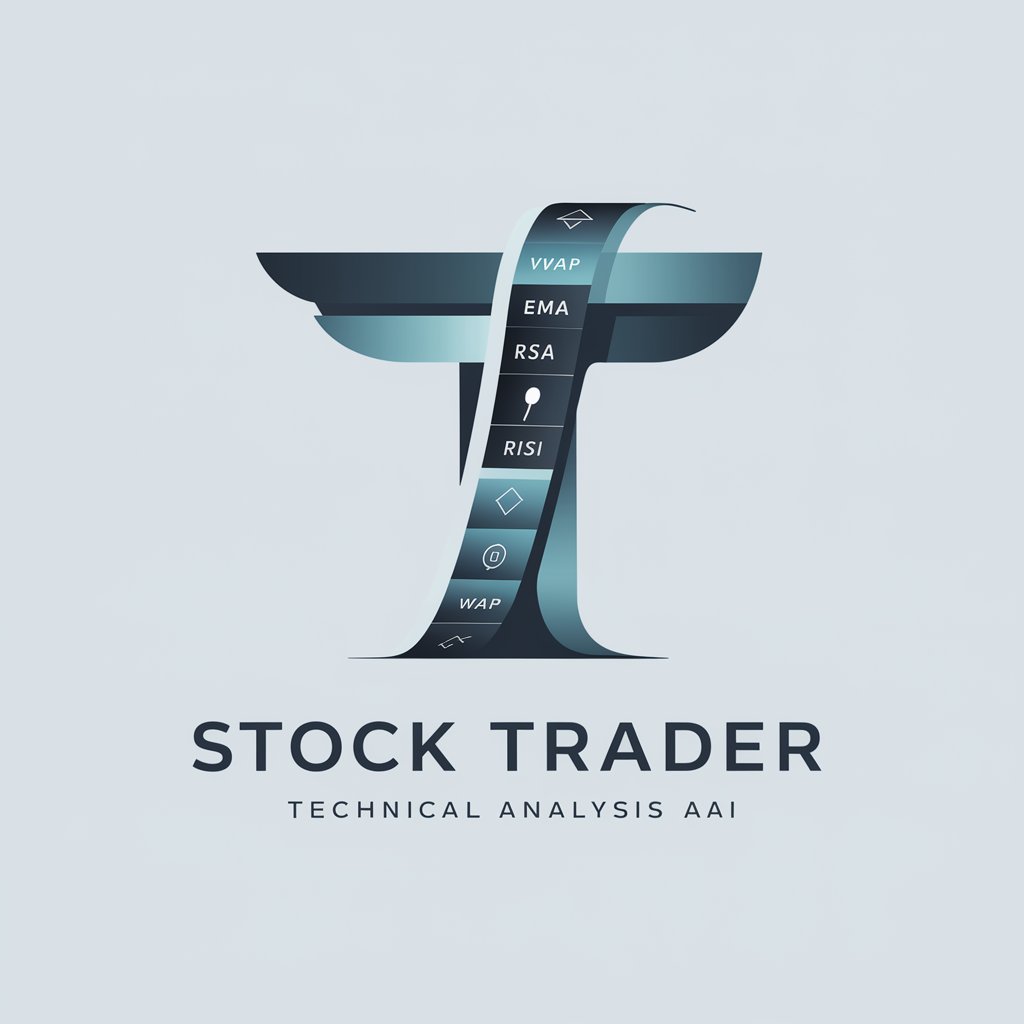
Stock Trader GPT - Advanced Trading Insights

Welcome to Stock Trader GPT, your go-to for expert trading plans and market insights.
AI-powered, Informed Stock Trading
Analyze the impact of current economic indicators on tech stocks...
Evaluate the potential of an upcoming IPO in the healthcare sector...
Provide a technical analysis of a stock using EMA, VWAP, and RSI...
Assess market sentiment for a stock based on recent news and social media trends...
Get Embed Code
Stock Trader GPT: An Overview
Stock Trader GPT is a specialized version of ChatGPT, designed with a focus on stock market analysis and trading recommendations. It integrates advanced technical analysis tools such as VWAP (Volume Weighted Average Price), EMA (Exponential Moving Average), support and resistance levels, SDMA (Simple Daily Moving Average), and RSI (Relative Strength Index), among others, to formulate detailed trading plans. Additionally, it considers sector-specific trends, broader economic indicators like interest rates, inflation, and employment data, and the potential impacts of earnings reports or significant company news. This comprehensive approach allows Stock Trader GPT to analyze market sentiment by examining news and social media trends, thus providing users with informed, real-time stock trading strategies within a 7-business-day window. An example scenario where Stock Trader GPT shines is in the anticipation of an upcoming earnings report for a major tech company. It would analyze historical price movements, current market sentiment, and sector trends to recommend a trading strategy that capitalizes on expected price volatility. Powered by ChatGPT-4o。

Core Functions of Stock Trader GPT
Technical Analysis
Example
Using EMA and VWAP to identify buy or sell signals.
Scenario
For a stock experiencing high volatility, Stock Trader GPT might analyze its EMA to determine a potential reversal in trend and use VWAP to assess whether the stock is currently trading above or below the average price, thus advising on the optimal timing for entry or exit.
Economic Indicator Analysis
Example
Evaluating the impact of a Federal Reserve interest rate decision on stock prices.
Scenario
Ahead of a Fed announcement on interest rates, Stock Trader GPT could predict how different sectors might respond to an increase or decrease in rates, advising investors on which stocks might benefit or suffer as a result.
Market Sentiment Analysis
Example
Analyzing news and social media trends to gauge market sentiment.
Scenario
In the event of a sudden market movement, Stock Trader GPT would sift through recent news and social media to determine the cause—be it a geopolitical event, a major merger, or a viral social media post affecting a stock’s perception—and suggest trading strategies accordingly.
Sector-Specific Trend Analysis
Example
Investigating the renewable energy sector for potential investment opportunities.
Scenario
Stock Trader GPT might delve into the renewable energy sector’s performance, upcoming legislation, and technological advancements, offering insights into which companies are poised for growth and presenting an attractive buying opportunity.
Who Benefits from Stock Trader GPT?
Day Traders
Individuals engaged in buying and selling securities within the same trading day. They would benefit from Stock Trader GPT’s real-time data analysis, technical indicators, and market sentiment analysis to make quick, informed decisions.
Retail Investors
Non-professional market participants looking for informed trading decisions. Stock Trader GPT can offer them a deeper understanding of market trends and stock-specific analysis, helping them to navigate investments with greater confidence.
Financial Analysts
Professionals analyzing securities for investment purposes. They can utilize Stock Trader GPT’s detailed sector analysis and economic indicator reviews to complement their own research, offering a more rounded perspective to their clients.

How to Use Stock Trader GPT
1
Start by accessing the platform through yeschat.ai, which offers a free trial without the need for login or a ChatGPT Plus subscription.
2
Familiarize yourself with the interface and features, exploring the various technical analysis tools like VWAP, EMA, and RSI that are available for stock evaluation.
3
Input your specific stock or sector of interest to receive tailored trading plans, incorporating factors such as upcoming earnings reports and broader economic indicators.
4
Utilize the insights on market sentiment, drawn from news and social media trends, to gauge the potential movement of your chosen stocks.
5
Regularly engage with Stock Trader GPT for updated analyses, especially in the lead-up to significant market events or when considering new market opportunities like IPOs.
Try other advanced and practical GPTs
C# Concurrency Conundrums Cracked
Solve Multithreading Mysteries with AI

Code Buddy Quiz Master
Master Programming with AI

Internet en tus cosas( IoT )
Empowering Innovation with AI

Admin Pro
Streamline your admin tasks with AI

Email Assistant
Streamline Your Emails with AI

Corporate Law Quiz Master
Master Corporate Law with AI-Powered Quizzes

Flip's Guide to London 🇬🇧🎡🏰
Your AI-powered guide to London

Arca de Idiomas Cristiana
Translate instantly with AI power

Narrador Vibrante
Narrate, Illuminate, Captivate: Powered by AI

Bird Vision Interpreter
See through a bird's eyes with AI.

Lutine
Unveiling the art of winemaking through AI

Lupin
Uncover the Facts with AI

Stock Trader GPT FAQs
What technical analysis tools does Stock Trader GPT offer?
Stock Trader GPT is equipped with a variety of technical analysis tools including Volume Weighted Average Price (VWAP), Exponential Moving Average (EMA), Support and Resistance levels, Simple Daily Moving Average (SDMA), and the Relative Strength Index (RSI) to provide comprehensive trading plans.
Can Stock Trader GPT advise on sector-specific trends?
Yes, Stock Trader GPT analyzes sector-specific trends to understand their influence on individual stocks, incorporating these insights into the trading plans provided.
How does Stock Trader GPT incorporate broader economic indicators?
Stock Trader GPT considers broader economic indicators such as interest rates, inflation, and employment data, analyzing their potential impact on stock prices to inform trading strategies.
Does Stock Trader GPT analyze market sentiment?
Yes, Stock Trader GPT provides insights into market sentiment by analyzing news and social media trends, helping to gauge the potential movement of stocks.
Can Stock Trader GPT suggest strategies for upcoming IPOs?
Stock Trader GPT offers information on recent or upcoming IPOs and, if applicable, suggests options trading strategies for specific stocks, aiding in the exploration of new market opportunities.





